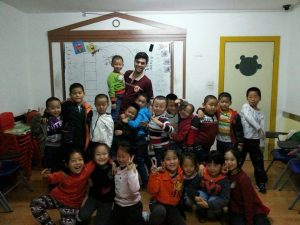Position: Student at St. John’s University School of Law
Field: Law
Graduated: 2012
The city of Harbin is located in China’s coldest and harshest province: Heilongjiang. Situated between Russia and North Korea, Harbin’s economic growth can be attributed to its rich soil, conducive mainly to wheat and soybeans, and as a prominent center for Russian trade. Despite its burgeoning economy and influx of foreign cultural trends, and by foreign I mean American, Harbin still seemed perilously close to the end of the world. This lonesome city rises in an unaesthetic abruptness from northern agricultural plains, emphasizing the extensive vastness that surrounds the area. The snow is accompanied by subzero temperatures—which are consistent for nearly half of the year—giving the city a colorless but reflective quality. This environment, coupled with the absurdity of Chinese culture, or so it seemed from my perspective, was a necessary disruption to have an unguarded moment of reinvention. I found myself in this city for nearly thirteen months, teaching English to children at two different schools. All of this occurred after graduating from the University of Mary Washington with a degree in American Studies.
The vicissitudes of college left me with the droning ambition to live abroad before making an official commitment to a law school. Such a long-term plan could not have been constructed without the help of the American Studies Department, the content of its classes, and especially an internship that honed my interest in law. Taking an interdisciplinary approach to specific topics forces students to consider multiple perspectives and, more importantly, question the assumptions and inferences of various beliefs. I chose to take mostly sociology and anthropology courses and concentrated my major in race and ethnicity. The emphasis on speaking and critical reading has manifested itself into my daily life and secured an unprecedented foundation as a perceptive, empathetic, and passionate individual.
As a student editor for Mary Washington’s collegiate newspaper, formerly known as The Bullet, these traits were immensely helpful in my ability to effectively communicate arguments and articulate ideas. Outside the classroom, I had an internship with Fredericksburg’s Department of Planning and Community Development. Interning for local government was a tangible experience of how my background in American Studies was directly applicable to real-world prospects. I conducted research in Fredericksburg titled, An Analysis of Impediments to Fair Housing, which involved working with local officials, housing experts and city residents to identity unequal housing practices. This assessment of public and private sector housing conditions displayed how laws have real consequences for those living under such regulations. These experiences solidified what I had learned throughout my college career and were tremendously relevant in graduating and subsequently teaching abroad.
Life after graduation can be overwhelming and it rarely passes without regrets. It takes endurance to find your way with any real confidence and certainty. However, I will always think fondly of UMW and the personal refinement of my time as an American Studies major.

